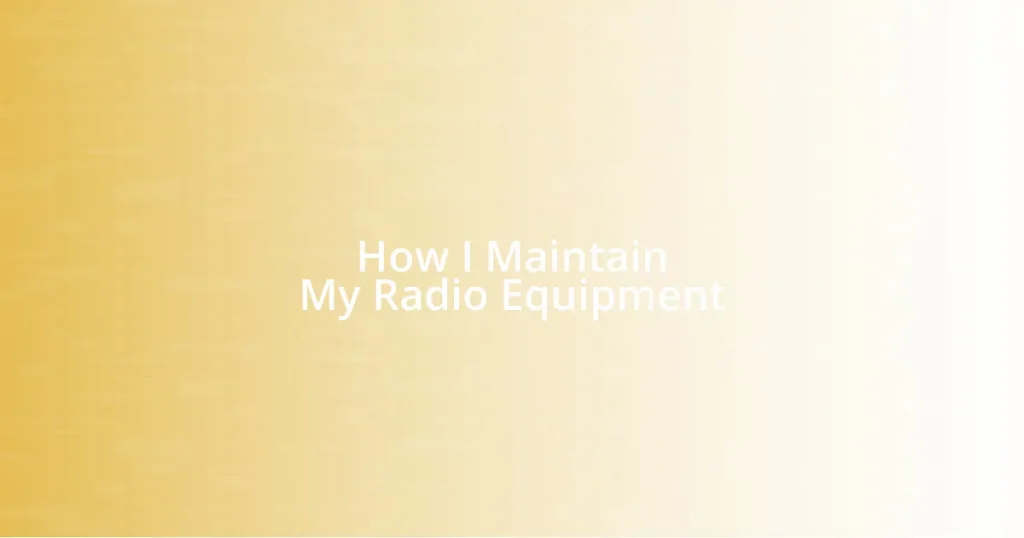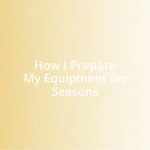Key takeaways:
- Regular maintenance and checkups of radio equipment prevent minor issues from escalating into major failures, ensuring both functionality and safety.
- Cleaning radio gear enhances performance; using the right techniques can significantly improve audio quality and reliability.
- Calibrating equipment is crucial for optimal performance, as even slight misalignments can lead to noticeable declines in sound quality.
- Upgrading components, such as microphones and speakers, revitalizes the listening experience and enhances overall audio fidelity.
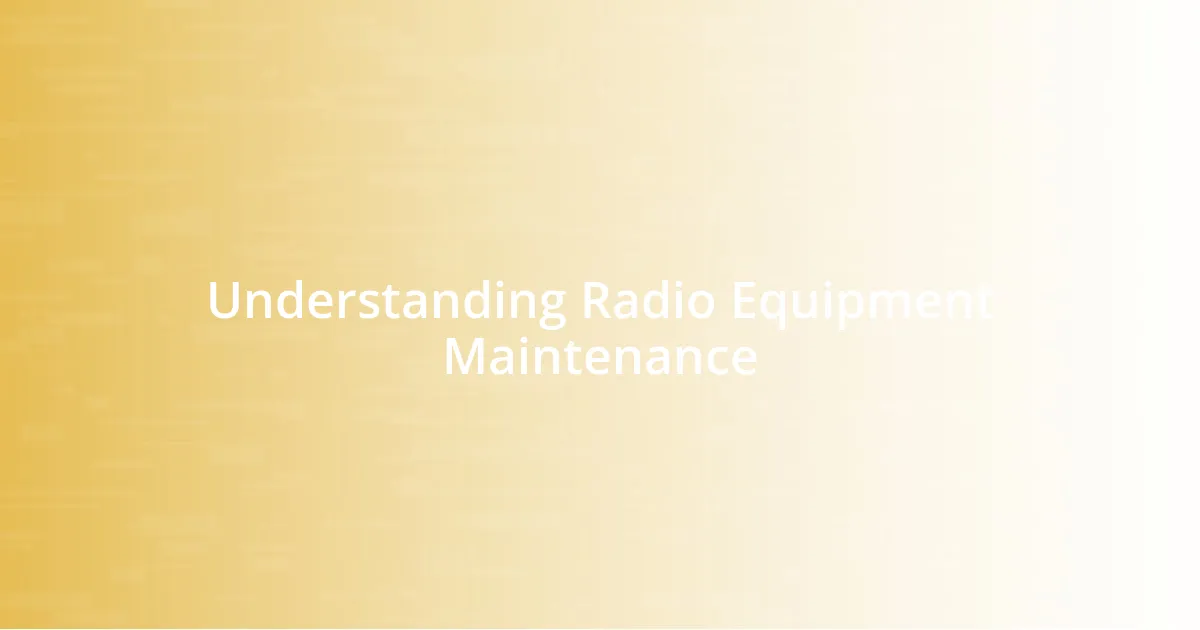
Understanding Radio Equipment Maintenance
Understanding radio equipment maintenance requires more than just routine checkups; it’s about forming a relationship with your gear. I remember the first time my radio went down during a crucial moment, and I realized that neglecting small issues could lead to major problems. Have you ever found yourself in a similar situation, wishing you had paid more attention to the little signals that something was off?
Regularly inspecting your equipment helps catch minor issues early. When I do my regular maintenance, I notice even the smallest imperfections, like a frayed wire or a loose connection. It’s surprisingly satisfying to identify these problems before they escalate. What about you? Do you find joy in that sense of proactive problem-solving, too?
Moreover, the emotional connection we have with our radio gear often drives us to take better care of it. For me, every piece of equipment represents countless hours of work, communication, and adventure. Don’t you feel a sense of pride when you know your radio is in top shape, ready to perform when you need it most? It’s this blend of emotional investment and practical know-how that makes maintenance not just a task, but a passion.

Importance of Regular Checks
Regular checks on my radio equipment are crucial for ensuring not just functionality but also safety. I once learned this the hard way when I neglected a simple battery check before a big field event. During the event, I found myself unable to communicate when it mattered most. The anxiety in that moment taught me that being proactive can prevent such nerve-wracking situations.
Furthermore, I find that routine inspections help me build a rapport with my gear. Each time I examine a connection or test the audio output, I reaffirm my commitment to its care. It’s like having a conversation with my equipment, understanding its quirks and needs. Have you ever experienced that moment of connection with something you use regularly? It makes maintenance feel less like a chore and more like a fulfilling part of my radio journey.
The benefits of these regular checks extend beyond the technical side; they also offer peace of mind. Knowing that I’ve thoroughly inspected my system allows me to focus on enjoying my activities without worrying about unexpected failures. This emotional reassurance makes all the difference, allowing me to make every broadcast a memorable one, rather than a stressful scramble.
| Benefits of Regular Checks | Consequences of Neglect |
|---|---|
| Identifying minor issues early | Major failures during critical moments |
| Building trust with equipment | Feeling disconnected and uncertain |
| Peace of mind and confidence | Increased anxiety and stress |
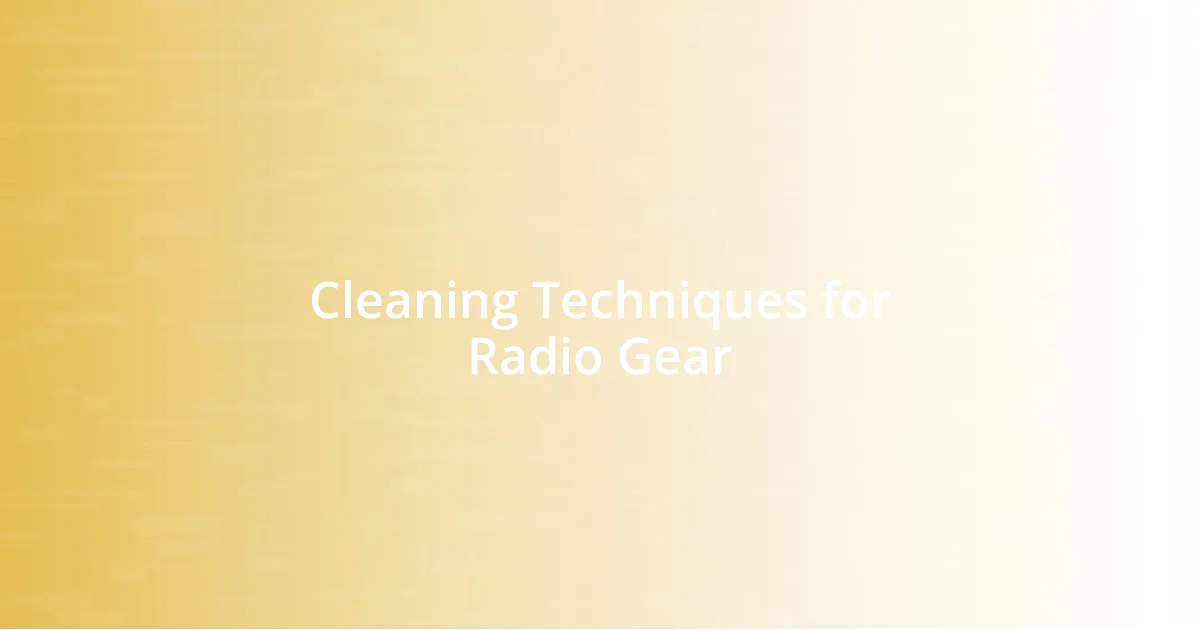
Cleaning Techniques for Radio Gear
Keeping radio equipment clean is essential for optimal performance. When I clean my gear, it’s not just about removing dirt—it’s about nurturing the equipment that supports my communication. I’ve had instances where a simple wipe down of the contacts vastly improved audio quality, reminding me how easily grime can interfere with functionality.
Here are some effective cleaning techniques I’ve found helpful:
- Use a microfiber cloth: It effectively picks up dust without scratching surfaces.
- Compressed air: This is perfect for removing debris in hard-to-reach places.
- Isopropyl alcohol: A diluted solution can clean connectors and switches without causing damage.
- Contact cleaner: I spray it on connections to ensure they work smoothly without buildup.
When I employ these techniques, I can almost feel the gear responding positively. It’s a satisfying moment, knowing I’m taking care of something that, in turn, takes care of me.
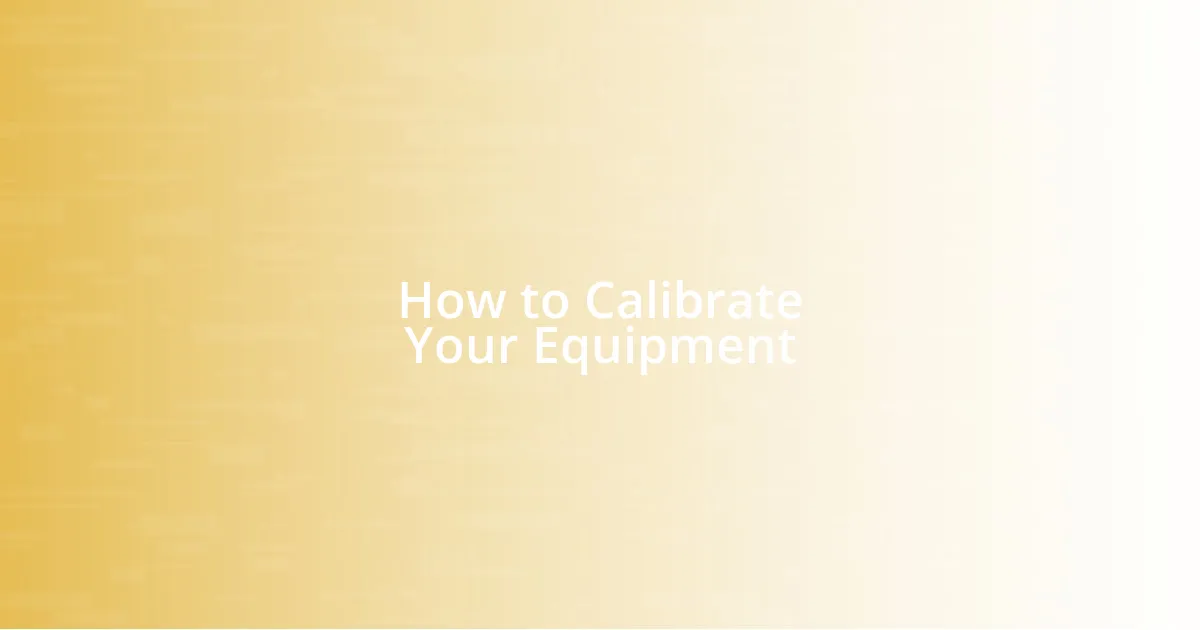
How to Calibrate Your Equipment
Calibrating my radio equipment is one of those tasks that demand both precision and a little intuition. When I start the process, I often feel a blend of excitement and anticipation, like getting ready for a performance. I typically begin by checking the frequency alignment; I’ve found that even a minor drift can lead to unexpected interference. Have you ever tuned in to a channel only to hear static? You’ll want to avoid that by ensuring everything is spot on.
Next, I usually pull out my audio level meters. Adjusting gain levels often feels like fine-tuning an old guitar; it’s all about finding that sweet spot. I once spent an entire afternoon doing this only to realize I had been using outdated reference levels. That little oversight taught me the importance of having the latest calibration data. It’s fascinating how a slight miscalibration can lead to notable differences in sound quality, right?
Finally, I take the time to test the output through a consistent monitoring setup. Listening intently during this stage is essential. The first time I calibrated my equipment with a focus on output accuracy, I was astounded by the difference in clarity and richness of sound. Each time I finish this process, I can’t help but feel a sense of accomplishment—knowing I’ve optimized my gear for whatever I’m about to tackle next. Don’t you think there’s something rewarding about knowing your equipment is performing at its best?

Troubleshooting Common Radio Issues
When it comes to troubleshooting common radio issues, I often encounter situations that can be surprisingly simple to resolve. One day, I was about to give up on a channel that had been fading in and out. Then it hit me—maybe it was just a loose antenna connection. Sure enough, after tightening it, the clarity returned, reminding me how easily minor details can derail our signals.
Another frequent issue I’ve faced is static or interference disrupting my broadcasts. I remember a time when my favorite station suddenly became a cacophony of noise. I realized that changing the frequency slightly could eliminate that annoying buzz. It’s amazing how a tiny adjustment can make a world of difference. Have you tried tuning frequencies a little to clear up sound? It works more often than you might think.
Lastly, there’s something about checking the power levels that can save the day. I’ve had moments when my equipment seemed unresponsive, and a simple check of the power supply revealed the problem—sometimes it’s just a matter of changing a battery or a loose plug. The relief I felt when everything powered back up is like a mini celebration. In those moments, I remind myself that even the best gear needs a little attention now and then. How about you? Have you experienced that same thrill of troubleshooting success?

Upgrading Your Radio Components
Upgrading my radio components is one of those tasks that rejuvenates my equipment and elevates my listening experience. I once invested in a high-quality microphone, thinking it might just be an incremental improvement, but the difference in clarity was nothing short of astonishing. Have you ever upgraded a component and felt like you transformed your entire setup? It’s like giving your radio a fresh start.
Then there’s the thrill of swapping out outdated speakers. I remember the day I unboxed a new pair, eager to hear the crispness of sound I’d been missing. The moment I hit play, I found myself smiling uncontrollably; it was as though I had rediscovered my favorite songs. This experience taught me how crucial it is to stay current with technology. When was the last time you considered what new components could bring back that excitement for you?
Of course, I always keep an eye out for new antennas. Upgrading to a more efficient model can sometimes feel like finding hidden channels. I vividly recall a rainy afternoon, surrounded by my gear, when I decided to switch out my old antenna for a newer one. The signal improvement was instant and invigorating! Those little moments remind me how crucial it is to nurture our passion for audio fidelity; do you think a simple component change could spark the same joy for you?










